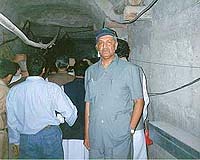
Pakistan tells court it wants more restrictions on A.Q. Khan
Islamabad: July 16, 2008 - Pakistan's government on Tuesday sought to tighten restrictions on nuclear scientist Abdul Qadeer Khan in response to a court challenge by his wife seeking his release from house arrest.
Khan, the father of the country's atomic bomb, has been effectively under house arrest in Islamabad since February 2004, when he confessed on television to transferring nuclear secrets to Iran, Libya and North Korea.
The scientist's wife earlier this month lodged a court challenge against the restrictions on her husband, who had cancer surgery in 2006, encouraged by a brief relaxation in recent months which allowed him to meet family and friends.
But Khan has angered the authorities with a series of recent media interviews, including several in which he alleged that President Pervez Musharraf knew he was taking centrifuges to North Korea in 2000.
"The government does not accept meeting of friends and well-wishers with Abdul Qadeer Khan after his irresponsible statements implicating institutions of the state," authorities said in a statement filed at Islamabad High Court.
Pakistan could suffer "sanctions and threats" from the International Atomic Energy Agency and the UN Security Council as a result of Khan's comments, said the statement, which was lodged in response to an appeal by Khan's wife.
"Anti-state elements in the garb of friends and well-wishers may want to manoeuvre to access him to extricate highly secret and confidential information," it added.
Khan's lawyer, Javed Iqbal Jaffery, told reporters outside the court that the government's statement was "defamatory and insulting".
"The reply filed by the government is a pack of lies, false and irresponsible," he said. "We have mistreated our heroes in the past and now the government wants to punish Khan."
He also accused Pakistani authorities of changing their stance, after insisting for years that he was not under detention.
Khan was pardoned by the US-backed Musharraf in 2004 but has been kept at his Islamabad villa ever since, guarded by troops and intelligence agents.
Musharraf has rejected international pleas to be allowed access to Khan.
Government lawyer Ahmar Bilal Sufi said that Pakistan had resisted international pressure to prosecute Khan for nuclear proliferation.
"The state is facing a difficult situation but at the same time it does not remain oblivious of its duty to provide security and protection to the scientist," Sufi told reporters.
Earlier this month the government's top nuclear authority, the Strategic Plans Division, rejected Khan's claims that Musharraf and the army had given him tacit approval to take nuclear equipment to Pyongyang.
No comments:
Post a Comment